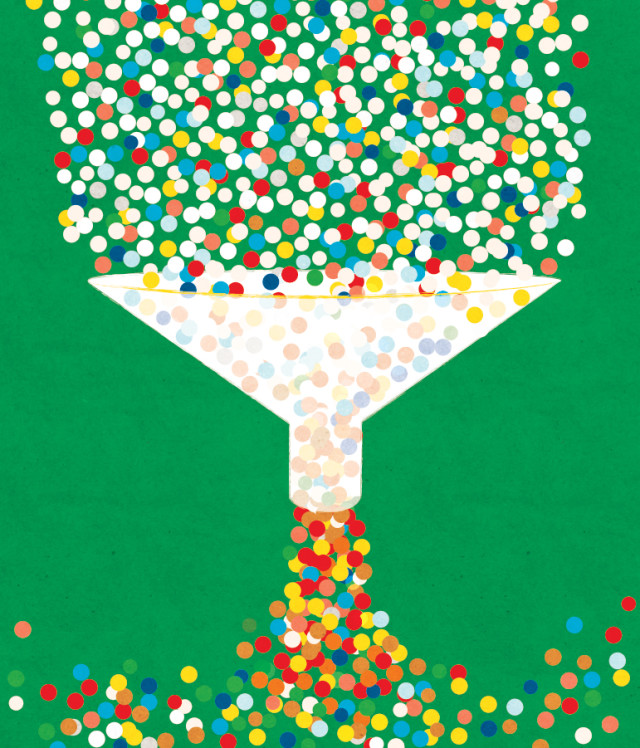The Radical XOXO Conference Thinks It Knows the Secret to Great Ideas: Get More Women

Image: Amy Martin
Ever since 2009, when she launched an online series about how video games portray gender, Anita Sarkeesian has received a steady stream of online abuse. Last summer, on a stage in a century-old Portland warehouse, she shared a small sample of the death, rape, and bomb threats hurled her way. Just before several hundred artists, entrepreneurs, and technologists leapt up in a standing ovation, she also imparted a hard-won insight: “One of the most radical things you can do is to actually believe women when they tell you about their experiences.”
This was arguably last year’s highlight at XOXO, an arts and technology gathering often described with adjectives rarely bestowed on professional conferences: moving, intimate, inclusive, earnest. The gathering, now in its fourth year, attracts people who use the Internet in many creative fields: music, television, books, comics, games, and more. The rule is that as long as you make something, you can apply to attend. (Yes, you have to apply.)
The resulting conclave of creativity and diversity stands out from the tedious, lanyard-wearing world of tech and business conferences. (XOXO defines itself as neither, but rather “an experimental festival celebrating independently produced art and technology.”) Attendees often rave about spontaneous conversations as much as the actual stage talks. When the fourth XOXO takes place at (and around) Revolution Hall from September 10 to 13, it will occupy a rare and valuable space: an Internet-focused event more interested in creating electricity between interesting people than in marketing or Silicon Valley–style self-congratulation.
Festival cofounders Andy Baio and Andy McMillan often refer to it as a “consensual hallucination”—the same phrase author William Gibson used in 1984 to describe cyberspace. After floating the idea for XOXO on Kickstarter in 2012, the duo raised more than $175,000 in only three weeks. “Everyone got the idea and could visualize it in their heads, and said, ‘Yeah, that’s what I want to go to,’” says Baio, Kickstarter’s former chief technology officer and now a Portland-based writer and entrepreneur.
The first two years of the festival included speakers like Dan Harmon, creator of the NBC comedy Community; Jonathan Coulton, a singer-songwriter whose lyrics about geek culture made him an online superstar; and Erika Moen, a web cartoonist who reviews sex toys. In addition to talks, XOXO wraps together live music, hands-on demos of unreleased video games, live podcasts, film previews, and television screenings.
After the inaugural festival, interest surged on euphoric word of mouth—and so did the inevitable backlash. Critics noted that for an event focused on creative disruption, the faces in the crowd sure were overwhelmingly white and male. “It was really frustrating to have an event that you think of as an arts festival, and then it mirrors the gender ratio of a tech event,”says Baio.
The solution was simple: The founders simply started to filter the lottery that distributes XOXO passes to include more women. “We’ve doubled the number of female-identified attendees from about 20 to 40 percent,” says McMillan. They also started factoring race, ethnicity, and disability into admission, and added a second lottery that will distribute additional, subsidized passes to underrepresented groups.
McMillan and Baio also made a deliberate attempt to shift the overall tone of the talks, bringing in more speakers like Sarkeesian to address the struggles of independent creators as well as the successes, and offer criticism as well as enthusiasm. (For transparency’s sake: Sarkeesian is a friend and colleague of the author.) “Independence is hard,” Baio says. “I think that last year was actually more helpful in a lot of ways: to hear the things that are challenging, the things that are difficult. Because it’s not an honest approach to say that everything’s just going to be great.”
Baio and McMillan are now gearing up to open a permanent, 13,000-square-foot workspace on Portland’s east side, where dozens of independent artists and creators will take up residence. “XOXO is six months of chaos that culminates in four incredible days, and that’s it. It goes away,” says Baio. “This gives us a lot of room to try other things and foster interest in projects.”
Although interest continues to grow, the founders are committed to maintaining the intimate feel that makes XOXO so special, capping attendance at 750 people—with 250 additional passes for evening events—even as thousands of applications for passes pour in. “If it got even a couple hundred people bigger, we’d ruin it,” says McMillan. “A lot of good people end up making their events bigger, and they don’t realize that’s ultimately going to be its demise.”
Nor do the XOXO founders harbor dreams of TED-esque expansion. “We would have no interest in doing this anywhere other than Portland,” McMillan says. “The whole ethos, the whole focus of the festival aligns so perfectly with the energy in the city that it would make absolutely no sense to do it anywhere else. XOXO belongs to Portland.”
Laura Hudson is a Portland-based contributor to Wired and the cofounder of Offworld, a female-focused video game community.




